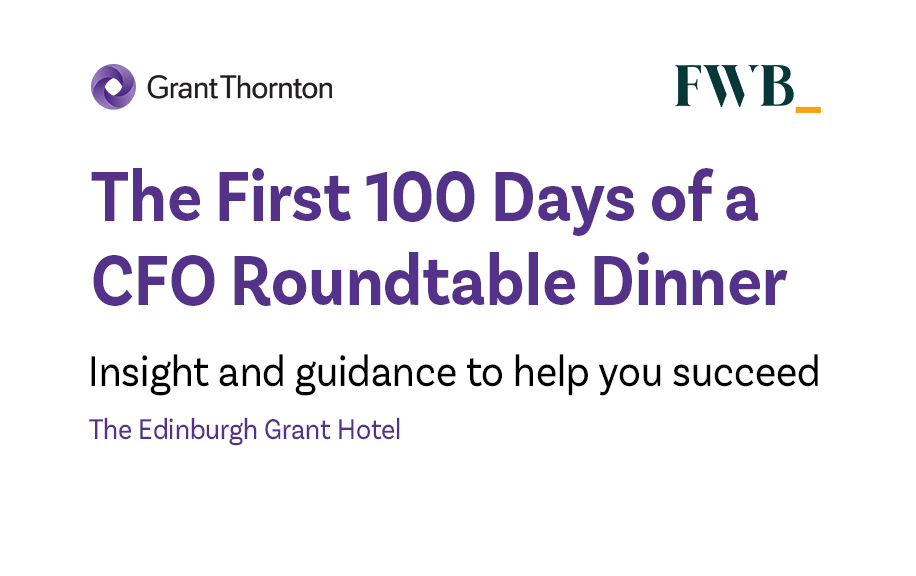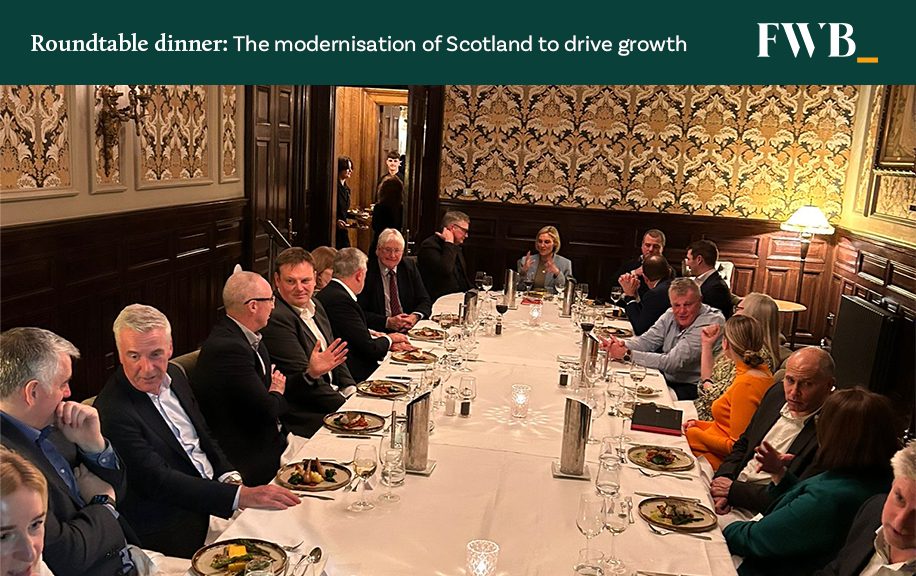Contact the team at FWB to discuss your individual or company requirements, or to discover more about our specialist services.
Journey to CFO Series: First 100 Days as a CFO
2 October 2024
- FWB Events

As part of a Journey to CFO Series of events we were delighted to partner with Grant Thornton on a “First 100 Days of a CFO” event to mark the launch of their recent CFO survey and report on this topic.
Michael Dickson and Grant Thornton Partner Debbie Mayor were joined by first-time and soon-to-be CFOs who were interested in hearing from an exceptional line-up of speakers and developing a peer-to-peer network of like-minded professionals on a similar career and development journey.
We were lucky to be joined by three excellent speakers, all at different points in their CFO journeys and with stories to tell.
These were:

Lorraine MacDonald
Financial Controller
The Glenturret
Recent CFO Awards winner for ‘One to Watch’ who has just taken her first No. 1 finance role on the Board with The Glenturret.

Alyson Donaldson
Group CFO
Donaldson Group
Experienced multi-sector and multi-ownership class CFO with experience across plc, private equity and family ownership including Diageo, Vets Now and Donaldson Group.

Stuart
Roberts
Group FD
James Jones & Sons
Specialist Corporate Finance and Banking Leader turned CFO and Managing Director with the likes of RBS, Quayle Munro, Robertson Group and now James Jones & Sons.
.
The conversation made clear that there is no one-size-fits-all and that getting it right isn’t easy. Today’s CFO is responsible for more than controlling costs and increasing profitability—you’ll be expected to drive change through long-term strategic initiatives and value creation.
This means that to set yourself up for success; you’ll have to understand the wider business strategy outside the finance function, build relationships with internal and external stakeholders, and identify areas for improvement much wider than within your own function.
Whilst Grant Thornton’s report (click here to download) covers many more topics, our conversation, Q&A, and debate focused on three main topics: ‘Building Relationships’, ‘Efficient and Effective Operations’, and ‘Looking To The Future’. The summary of the discussion is below:
Building relationships
• Align with stakeholder objectives: Gain a thorough understanding of the strategic goals and expectations of shareholders and stakeholders. Ensure your 100 day plan and objectives are aligned with the broader strategy of the organisation.
• Outside the Board meetings: Develop strong relationships with fellow Board members, executives, and stakeholders outside of Board meetings. Understand their perspectives, build trust, and establish open lines of communication.
• Collaborative leadership: Effective collaboration and stakeholder engagement is essential to ensure collective progress. Build trusting relationships and foster an environment where ideas are shared.
• Balanced leadership approach: Empower and support team members while providing clarity on objectives. Be assertive when necessary, maintaining high standards of accountability and performance.
• Adaptability to diverse needs: Flex your leadership style, adapting to the specific needs of team members and stakeholders to achieve optimal outcomes.
• Cultivate a positive work culture: Actively work to foster a positive, inclusive, and engaging environment within your team and across the organisation to support a productive but enjoyable workplace.
• Remain open to feedback: A successful leader is one who embraces continuous learning, from both peers and team members, adjusting your style based on constructive input.
.
Efficient and effective operations
• Identify key business drivers, including internal and external influencing factors: A deep understanding of these elements is crucial for informed decision-making and long-term success. Focus on the key items which move the needle.
• Establish clear and impactful Key Performance Indicators (KPIs): These should focus on metrics that directly impact business performance, foster continuous improvement and align with the values and drivers of your organisation. Ensuring KPIs are relevant, understood and measurable, while being monitored on an ongoing basis, will be critical to success.
• Prioritise critical information: Avoid overwhelming teams with excessive data, ensuring that communication is clear. Focus on delivering the most essential information that enables them to drive positive change and enhance performance.
• Leverage your expertise where it adds the most value: Concentrate efforts in areas where your skills and insights can make a meaningful impact. Building strong teams and delegating is a key factor in this.
• Stay ahead of change: Keep abreast of industry trends, technological advancements, and market events that may shape future business strategies. Adaptability and agility will help you remain competitive.
• Embrace technology for operational efficiency: Evaluate how emerging technologies, such as Power BI and artificial intelligence (AI), can enhance efficiency in business operations. While these tools can drive innovation and insights, they ensure that outputs are critically assessed and fully validated.
• Modernise legacy systems thoughtfully: Ensure that any new technology solutions are fully integrated and compatible with existing processes, considering the culture and original authors. Avoid disruption by implementing gradual, well-communicated changes.
• Foster a trusting and collaborative culture: Introduce changes in a way that builds trust and maintains credibility. Involve teams in decision-making processes, listen to feedback, provide a clear rationale for change, and empower individuals.
• Ensure long-term strategic alignment: Continuously evaluate whether technology implementations, process improvements, and KPIs are driving toward the company’s overall growth and sustainability goals.
.
Looking to the future and strategies for success
• Remain aligned with stakeholder objectives and broader strategy: Stay close to the key objectives, purpose/values, priorities, and long-term strategies of shareholders and stakeholders. Ensure your initiatives are in harmony with the organisation’s overall vision, and maintain open communication regarding differing views.
• Continuously evaluate the business environment: Regularly assess internal and external factors that may affect the business, including strengths, weaknesses, opportunities, and threats (SWOT). Be proactive in adapting to changing market conditions and organisational needs.
• Adopt a long-term strategic view: Go beyond short-term gains by focusing on the company’s strategy over the next 3, 5, and 10 years. Consider how today’s decisions will impact the future and ensure that your actions support sustained growth and resilience.
• Maintain clarity in strategy amid complexity: Keep the company’s strategic goals straightforward and accessible, even as the business environment becomes more complex. Adapt the strategy as circumstances evolve, ensuring it remains relevant.
• Leverage and expand your professional network: Continuously expand your connections by engaging with new contacts, industry peers, and thought leaders to gain fresh perspectives on business challenges and opportunities.
• Evolve from financial leader to business strategist: Expand your focus beyond finance. Your role will likely involve driving the wider business strategy and contributing to holistic business decision-making.
• Be a strategic advisor to the CEO: Leverage your financial acumen and position yourself as a key advisor to the CEO across broader business issues. Offer insights into operations, strategic planning, risk management, and cross-functional collaboration.
• Focus on technology and digital transformation: A strong understanding of technology is crucial in a modern leadership role. Stay informed about emerging trends, such as digital transformation, automation, and artificial intelligence, and how they can enhance efficiency and drive innovation within your organisation.
• Lead with a people-centric approach: As your responsibilities broaden, ensure you are approachable and build strong relationships across all functions. Support culture development and work to ensure that the company attracts and retains top talent.
• Regularly revisit strategic assumptions: Periodically reassess the underlying assumptions of your strategic plan. As the market changes, ensure that your strategy remains relevant and adjust to capitalize on emerging trends or mitigate risks.
• Develop leadership skills and succession planning: Focus on cultivating team leadership capabilities. Prioritise succession planning and leadership development to ensure the company has the internal talent to support its long-term growth objectives.
Lorraine, Alyson, and Stuart’s experiences sparked insightful conversations and highlighted CFOs’ non-linear paths and the importance of adaptability in an ever-changing business environment.
The event underscored that CFOs are now expected to lead with a “people-first” approach, balancing technical and financial acumen with strong interpersonal skills. As CFOs evolve into strategic business partners, they must not only understand numbers but also how those numbers tie into the company’s culture, mission, and long-term objectives. In fact, a recurring theme across the conversation was the need for today’s CFOs go beyond traditional roles of cost control and profitability. They are increasingly seen as the right strategic partner for a CEO, a strategic business leader tasked with driving long-term initiatives that enhance value creation. This shift requires CFOs to cultivate strong relationships across the organisation, understand wider business objectives, and think beyond finance, including operations, technology, and culture.
In summary, the role of a CFO has expanded significantly, requiring a delicate balance of strategic insight, operational efficiency, and human leadership. By fostering relationships, leveraging technology, and thinking beyond finance, CFOs can position themselves as invaluable assets in shaping the future success of their organisations.
For those interested in attending similar events, please contact our Events Lead, Laura McDonald (events@fwbltd.com), or Director, Michael Dickson (michael@fwbltd.com), who can provide more information.
If you would like more information on the Grant Thornton ‘Your first 100 days as a CFO’ report, please contact Debbie Mayor at debbie.mayor@uk.gt.com.





